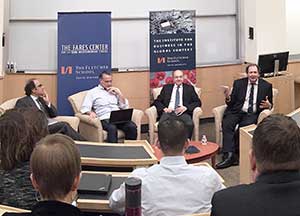
Tufts University played host to Jordanian entrepreneur Fadi Ghandour, who offered his analysis of the business climate in the Middle East.
By Sal Ghamo
On April 21 at 5:30 pm, The Fletcher School at Tufts University invited Jordanian entrepreneur Fadi Ghandour to analyze the role business and entrepreneurship plays in creating significant change in the Middle East. Ghandour is responsible for founding Aramex, an international express, mail delivery and logistics services company based in Dubai.
The Fletcher School is attempting to adjust their focus in terms of international relation and business. A huge part of the Fletcher perspective is encouraging the relevancy of a cultural and political context that can help bolster an accurate perception of other countries status in terms of business.
The goal is to create a network of like-minded people, and the first step seems to be bringing this business-history hybrid to fruition. Fadi Ghandour shared his own candid point of view that functioned as a type of commencement for the insurgency at Fletcher that revokes the antiquated, ethnocentric perception of different countries business and culture. The entrepreneurial advantages, as well as the political freedom that people in the Middle East are facing is something we need to pay attention to because it’s becoming more relevant on social media every day.
Ghandour began the discussion with regard to business’ role in society.
Aramex is not only a lucrative and prominent organization, but it is also responsible for several progressive movements in Jordan. The activist organization has a relationship with youth across the region, so much that they re-invented basketball for men and women in Jordan. In any business, the private sector needs to have a relationship with the people.
One critical misperception Ghandour disentangled was that ISIS is not the leading force in the Arab world. Youth empowerment has become a reality, and radical ideologies are not galvanizing on the streets instilling fear into people. Arab Youth surveys show that people believe their best days are ahead of them, that they want jobs, that they want to fight corruption, and that they are indeed worried about ISIS but outright refuse the ideology.
We may see the Arab world in a dismal light, but it is only defined in that way because of our own lack of awareness. Even in the most hellish of situations, the youth doesn’t want to stay in a position that isn’t defined by progression and ambition. Saudi Arabians have found that Twitter and Facebook are a platform for self-expression and communal discussion.
The media paints a perception of the Arab world, as well as other countries, that isn’t accurate. People are expressing their opinions freely in several regions across the globe, and they are transcending over traditional beliefs and societies hold on them in a cyber fashion that we need to be more mindful of.
Ghandour referred to the startup world in Lebanon, Jordan, Egypt, and other countries as “The Access of Innovation.” People in these regions have realized that they’re all connected and that individuals established abroad want to start businesses where they’re located. So, residents in these regions decided to develop their own platforms without the help of external sources.
There’s a growing market online, and there are even companies like Uber on the rise in Saudi Arabia. Regulators can’t keep up with people who are using technology to become Uber drivers on their own because they can’t understand how the technology works in the first place. In addition to that, can you really tell people they can’t work as a taxi driver in a country where the unemployment rate is as high as 27 percent?
The reality is that individuals in other countries are doing business, and are pushing forward through structural impediments. People who are taking risks like Ghandour and investing in startups are watching the hold regimes once had on people crumble away beneath an empire of ambitious youth.













Reader Comments